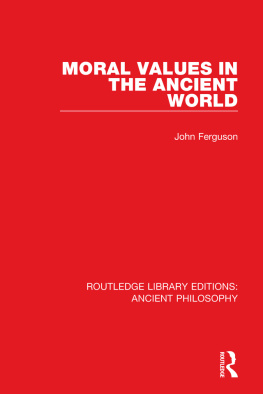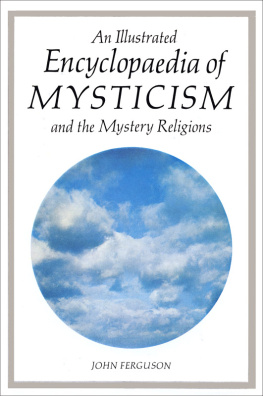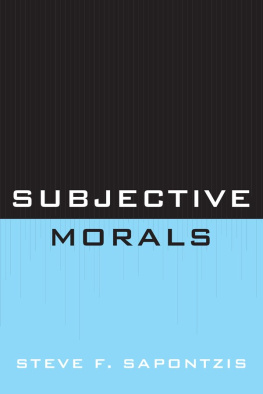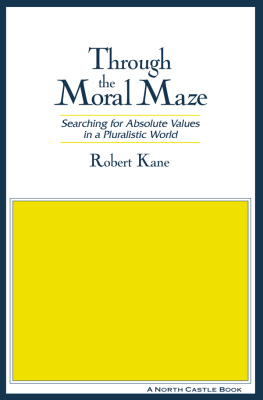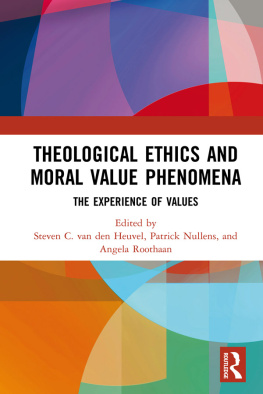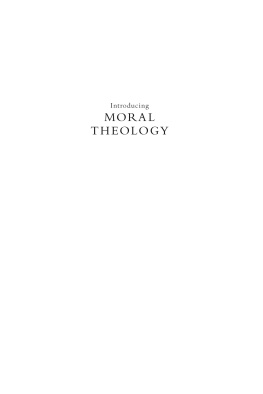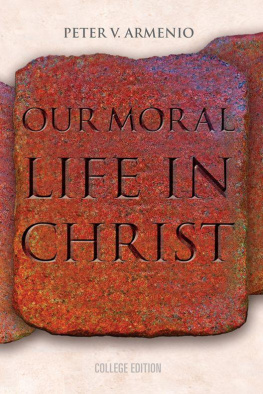Routledge Library Editions: Ancient Philosophy
Volume 3
MORAL VALUES IN THE ANCIENT WORLD
Moral Values in the Ancient World
John Ferguson
First published in 1958
by Methuen & Co Ltd
This edition first published in 2017
by Routledge
2 Park Square, Milton Park, Abingdon, Oxon OX14 4RN
and by Routledge
711 Third Avenue, New York, NY 10017
Routledge is an imprint of the Taylor & Francis Group, an informa business
1958 John Ferguson
All rights reserved. No part of this book may be reprinted or reproduced or utilised in any form or by any electronic, mechanical, or other means, now known or hereafter invented, including photocopying and recording, or in any information storage or retrieval system, without permission in writing from the publishers.
Trademark notice : Product or corporate names may be trademarks or registered trademarks, and are used only for identification and explanation without intent to infringe.
British Library Cataloguing in Publication Data
A catalogue record for this book is available from the British Library
ISBN: 978-1-138-20063-0 (Set)
ISBN: 978-1-315-47325-3 (Set) (ebk)
ISBN: 978-1-138-20266-5 (Volume 3) (hbk)
ISBN: 978-1-138-20270-2 (Volume 3) (pbk)
ISBN: 978-1-315-47333-8 (Volume 3) (ebk)
Publisher's Note
The publisher has gone to great lengths to ensure the quality of this reprint but points out that some imperfections in the original copies may be apparent.
Disclaimer
The publisher has made every effort to trace copyright holders and would welcome correspondence from those they have been unable to trace.
MORAL VALUES IN THE ANCIENT WORLD
JOHN FERGUSON
LONDON
METHUEN & CO LTD
36 ESSEX STREET WC2
First published 1958
Catalogue No 6094/U
1958 John Ferguson
Printed in Great Britain
by Western Printing Services Ltd Bristol
FOR
N.M.J. C.L.H.T. C.M.
C.S.C. G.A.G. H.C.
who laid the foundations
Contents
THIS BOOK STUDIES some of the moral values which were current in the Ancient World. It is curious that, so far as I can ascertain, no such study has hitherto been made, though there have been investigations, on varying scales and of varying value, of particular topics, and innumerable books in the vaguer field of Greek ideals. Reference to particular studies will be found in the appropriate chapters.
The presentation, though not, I hope, the investigation, has been influenced by certain presuppositions which emerged in the course of the investigation. History is always continuous. But we can rightly and properly mark off certain periods as having an integrity or completeness of their own. Such is the GraecoRoman civilization, and whether one dates its finale to the accession of Constantine at the beginning of the fourth century A.D., or the fall of Rome in 410, or some other convenient landmark, it is factually true that the change is associated with the predominance of Christianity. Christianity can thus be seen as the culmination and conclusion of the old order as well as the beginning of the new. The method by which Christianity spread suggests that it served to fulfil the aspirations of the world to which it came. One potent factor in helping it to spread was the concept of Christian love or agape. I have thus come to see earlier evaluations to some extent against the background of that agape which gave satisfaction where they had failed, and this presupposition affects the presentation. But the presupposition arises from historical fact, not religious dogma.
Secondly, the question becomes inescapable: what has agape got that the rest haven't got? The details of the answer lie in the remainder of this study. But the investigation forced certain conclusions which are written back into the earlier chapters. It is a cardinal principle of science that the simplest explanation consistent with the facts is the most scientifically admirable. When Copernicus and his followers were able to dispense with the complex Ptolemaic cycles and epicycles by setting the sun at the centre of the universe, it was a scientific advance; when Newton was able to subsume Kepler's laws of motion under the single law of gravitation, it was a scientific advance. Much science consists in finding a single explanation for many phenomena. We do not know that this is reflected in reality; it is rather a necessity of the human mind. So it seems that the human mind seeks for a single ethical principle, or at least to reduce ethics to its simplest proportions, and principles of limited application do not satisfy. In particular, at this point thinking man (it is by no means true of all societies) demands that religion and ethics come together. Thinking man rejects unethical religion, and though he (or she) has more recently aspired towards Morals without Religion, this is scarcely important in the Ancient World, where absolute atheism was rare, and even the Epicureans had a more religious approach to ethics than was at one time believed. I have tried to show that agape satisfied because it was comprehensive, and have assumed it to be a defect in earlier evaluations that they were not.
I have been persuaded by the thought of the Greekless reader, combined with the exigencies of book-production, to transliterate into English isolated Greek (or Hebrew) words in the text. Quotations I have left, but they are invariably either translated or explained. Such transliterations are not very satisfactory, like most compromises, and I hope those whom they offend will show forbearance. Greekless readers may like to be reminded that final 'e' in such words is pronounced e.g. dike is a two-syllable word.
My thanks are due to many people, among whom must be especially named my colleague Mr. H. F. Guite for much constructive help, my secretary Mr. M. B. Akanji for typing the MS., and my wife for her aid with the proofs and index, and her continual patience and encouragement.
I
The Homeric Age
THE TWO POEMS whose author we call Homer are difficult to use as evidence of social custom and personal belief because they reflect in part the poet's own society of the ninth or eighth century B.C., in part the traditions about the world of some centuries earlier, which he is overtly depicting. Archaeology has gone some way towards helping us to disentangle the threads, but many problems remain. None the less the poems remain our earliest literary source about Greek civilization (for the recently deciphered documents of the Mycenaean age are hardly to be called literary) and it is here that our beginning must lie.
Society is aristocratic. At its head stands Agamemnon, king of kings, lord of 'many islands and of all Argos'.
'The kingship is his by hereditary right, he is the leader in war, and at his side are the council of elders and the army assembly.'
The elders are, so to speak, the king's 'companions' but each of them is a king in his own right, and has his own group of 'companions'. It was the break-up of the Mycenaean dominion which gave to these kings their full independence, and brought about the city-state structure familiar in classical Greece. In turn the weakening of their own authority vis--vis that of their companions led to the transformation of monarchy into aristocracy. Meantime the seeds of a more fundamental transformation were burgeoning. The army assembly represents a concession to the voice of the people. It had no authority, but the king would be foolish lightly to flout its will. It is here that Thersites makes his

